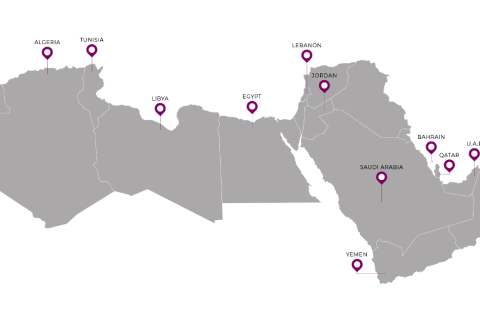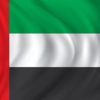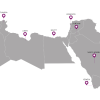A Guide for IP Experts – Introduction to The Omani Trademark Law
1. Why Trademark protection in Oman?
Before delving into Trademark Law in Oman, it is important to highlight why brand owners should seek protection in Oman.
- Growing Economy: The greatest legacy of the late Sultan Qaboos bin Said, may Allah bless his soul, lies in his steadfast commitment to non-interference in regional and international affairs. Now, Sultan Haitham Bin Tariq is following the same steps, with his aim to expand international trade and investments. This has led to widespread changes in Oman’s economy, which has been steadily growing, driven by diversification efforts and investment in various sectors such as tourism, logistics, and manufacturing. As the economy expands, there is increased market potential for various goods and services, making trademark protection crucial to establish and maintain a strong presence in the market.
- Strategic Location: Oman’s strategic location, at the center of the maritime passage between East Asia, Africa, and the Arabian Peninsula, makes it an attractive market for international businesses looking to expand their reach. Oman is situated opposite the Indian Ocean, the Arabian Gulf, the Gulf of Oman, and the Arabian Sea. This geographical positioning has made it a hub for regional and global investment. Historically, Oman’s contacts with the rest of the world were primarily by sea, spreading Omani trades all over the world for thousands of years. Oman has an exclusive economic zone that extends into international waters. With its well-developed infrastructure and ports, Oman serves as a gateway to regional and international markets. This makes trademark protection essential for safeguarding brands against infringement in this potentially lucrative market.
- Intellectual Property Regulations: Oman has made significant strides in strengthening its intellectual property laws and regulations to align with international standards. The Sultanate has implemented robust legal frameworks to protect copyrights, patents, trademarks, and industrial designs, recognizing the importance of intellectual property rights in fostering innovation and economic growth. By offering robust trademark protection, Oman provides a conducive environment for businesses to safeguard their brands and intellectual property rights. These laws comply with the provisions of the World Trade Organization’s Agreement on Trade-Related Aspects of Intellectual Property Rights (TRIPS). The government has also established enforcement mechanisms to combat intellectual property infringement, demonstrating its commitment to creating a secure and conducive environment for businesses and innovators. These advancements reflect Oman’s dedication to promoting creativity, supporting economic development, and attracting foreign investment.
- Emerging Consumer Market:Oman’s population is relatively young, with a growing middle class and increasing disposable income. This demographic shift presents a dynamic and emerging consumer market. This youthful demographic is tench-savvy, increasingly educated, and has growing purchasing power. They are driving demand in various sectors such as technology, retail, entertainment, and e-commerce. The government’s efforts towards economic diversification and digital transformation are further fueling this growth. Businesses looking to tap into this market will find ample opportunities for growth and expansion. Protecting trademarks in Oman helps ensure brand recognition, loyalty, and market share as consumer preferences evolve. Understanding the unique needs and preferences of this young consumer base will be key to successful market penetration and brand establishment. As such, Oman’s young population is not just shaping the consumer market of today, but also defining the market trends of the future.
- Foreign Investment: Oman has always been a welcoming destination for foreign investment, under the leadership of His Majesty Sultan Haitham Bin Tariq, welcomes foreign investment. His Majesty is leveraging his international connections to attract foreign investors and heads of companies. The government of Oman has implemented policies to attract businesses from around the world, including tax incentives, streamlined business registration processes, and robust protection of intellectual property rights. These measures not only provide legal safeguards for foreign investors but also demonstrate a commitment to respecting intellectual property rights, enhancing the attractiveness of Oman as a destination for investment and business expansion. Oman’s strategic location, stable political environment, and robust infrastructure make it an attractive destination for investors. Coupled with the country’s commitment to economic diversification and modernization, these factors have resulted in a surge of foreign investment in various sectors such as energy, tourism, logistics, and manufacturing. This influx of foreign investment is playing a pivotal role in driving Oman’s economic growth and development. Notable investments include the Saudi Investment Fund, which invested more than $5 billion last year, and The Trump Organization, the family business of former US President Donald Trump, which struck a deal with Saudi Arabia’s Dar Al Arkan to develop a $4 billion real estate and golf course project in Oman. As such, Oman continues to be a promising and lucrative market for foreign investors.
- Regional Hub: Oman has always been a welcoming destination for foreign investment, under the leadership of His Majesty Sultan Haitham Bin Tariq, welcomes foreign investment. His Majesty is leveraging his international connections to attract foreign investors and heads of companies. The government of Oman has implemented policies to attract businesses from around the world, including tax incentives, streamlined business registration processes, and robust protection of intellectual property rights. These measures not only provide legal safeguards for foreign investors but also demonstrate a commitment to respecting intellectual property rights, enhancing the attractiveness of Oman as a destination for investment and business expansion. Oman’s strategic location, stable political environment, and robust infrastructure make it an attractive destination for investors. Coupled with the country’s commitment to economic diversification and modernization, these factors have resulted in a surge of foreign investment in various sectors such as energy, tourism, logistics, and manufacturing. This influx of foreign investment is playing a pivotal role in driving Oman’s economic growth and development. Notable investments include the Saudi Investment Fund, which invested more than $5 billion last year, and The Trump Organization, the family business of former US President Donald Trump, which struck a deal with Saudi Arabia’s Dar Al Arkan to develop a $4 billion real estate and golf course project in Oman. As such, Oman continues to be a promising and lucrative market for foreign investors.
2. Primary trademark laws and implementing regulations relating to trademark protection and enforcement in Oman:
- The primary trademark laws and implementing regulations in Oman are as follows:
- Sultani Decree No. 68/1987: This decree regulates the protection of marks and trade indications in 41 articles, including the definition of trademarks, their registration procedures, appeals, objections on disputes concerning these marks, as well as their renewal and deletion.
- Law of Industrial Property Rights (Royal Decree No. 67/2008): This law is the primary legislation governing intellectual property rights in Oman, including trademarks. It outlines the requirements for trademark registration, the rights conferred by registration, and the procedures for enforcement.
- Royal Decree No. 38/2000: This decree promulgates the Law on Trademarks, Indications, Secrets, and Protection against Unfair Competition.
- GCC Trademark Law: Trademark laws in Oman are also regulated by the GCC trademark law and its implementing regulations.
These laws ensure that trademarks are properly registered, protected, and enforced within Oman.
3. Primary International treaties and agreements relating to trademark protection and enforcement in Oman:
Oman is a signatory to several international treaties and agreements that relate to trademark protection and enforcement:
Oman is a signatory of multiple international IP treaties which facilitate IP protection, and enforcement including:
Paris Convention for the Protection of Industrial Property: Oman acceded to the Paris Convention on November 7, 2000. The Paris Convention establishes basic principles of protection for industrial property, including trademarks, patents, and industrial designs.
- Nice Agreement: Concerning the International Classification of Goods and Services for the Purposes of the Registration of Marks (commonly referred to as the Nice Agreement) on May 26, 2015. By becoming a member of the Nice Agreement, Oman committed to using the Nice Classification system for the classification of goods and services in trademark registration procedures. This facilitates international trademark registration and harmonizes classification practices with other member countries of the Nice Agreement.
Patent Cooperation Treaty (PCT): Oman became a member of the Patent Cooperation Treaty on July 21, 2000. The PCT facilitates the filing of international patent applications, streamlining the process for seeking patent protection in multiple countries.
- Berne Convention for the Protection of Literary and Artistic Works: Oman joined the Berne Convention on January 20, 2008. The Berne Convention sets standards for the protection of copyrights and related rights, ensuring that authors and creators receive adequate protection for their works.
Trademark Law Treaty: Oman joined the Trademark Law Treaty (TLT) on October 16, 2007. The Trademark Law Treaty is aimed at simplifying and harmonizing procedural aspects of trademark registration and related administrative procedures among member countries. With Oman’s accession to the TLT, it has committed to implementing the provisions of the treaty within its national trademark laws and procedures, further enhancing its intellectual property framework.
World Intellectual Property Organization (WIPO) Convention: Oman is a member of the WIPO Convention, having joined on September 4, 1976. The WIPO Convention establishes the framework for international cooperation in the field of intellectual property and provides assistance to member states in developing and implementing effective intellectual property policies.
Agreement on Trade-Related Aspects of Intellectual Property Rights (TRIPS Agreement): Oman, as a member of the World Trade Organization (WTO), is bound by the TRIPS Agreement. The TRIPS Agreement sets minimum standards for the protection and enforcement of intellectual property rights, including trademarks, patents, copyrights, and trade secrets.
- WIPO Copyright Treaty and WIPO Performances and Phonograms Treaty: Oman joined the WIPO Copyright Treaty (WCT) and the WIPO Performances and Phonograms Treaty (WPPT) on September 20, 2005, it signifies the country’s commitment to upholding international standards for copyright protection and related rights.
- The WIPO Copyright Treaty (WCT) and the WIPO Performances and Phonograms Treaty (WPPT) are two key international treaties administered by the World Intellectual Property Organization (WIPO). They address copyright protection in the digital environment and related rights of performers and producers of phonograms, respectively.
- Madrid protocol: Oman acceded to the Madrid Protocol concerning the International Registration of Marks on July 16, 2007. As a member of the Madrid Protocol, Oman allows trademark owners to seek international protection for their trademarks by filing a single application through the World Intellectual Property Organization (WIPO), simplifying the process of trademark registration in multiple member countries of the Madrid system.
These treaties facilitate international cooperation in the field of intellectual property and offer a framework for securing and enforcing trademark rights in Oman on an international level.
4. Oman Trademark Authorities
In Oman, the primary authority responsible for trademarks is the Directorate General of Intellectual Property at the Ministry of Commerce, Industry, and Investment Promotion (formerly the Ministry of Commerce and Industry- MOCIIP). This authority oversees trademark registration, examination, and enforcement procedures in the country.
Here are the key trademark authorities in Oman:
Directorate General of Intellectual Property: This government department is responsible for administering trademark registration and enforcement in Oman. It handles the processing of trademark applications, examination of trademark registrations, and enforcement of trademark rights.
The judicial system in Oman is based on a civil law framework influenced by Islamic law (Sharia). The system is structured to ensure the administration of justice in accordance with the country’s laws and legal principles. Here is an overview of the key components of the judicial system in Oman:
- The Judiciary: The judiciary in Oman is composed of various courts that adjudicate civil, criminal, commercial, and administrative matters. Judges are appointed by royal decree and are required to uphold the rule of law and administer justice impartially.
- Supreme Court: The Supreme Court of Oman is the highest judicial authority in the country. It hears appeals from lower courts and provides guidance on legal matters. The Supreme Court ensures uniformity in the interpretation and application of laws throughout the country.
- Courts of Appeal: Oman has several Courts of Appeal located in different regions of the country. These courts hear appeals from lower courts and review decisions on both civil and criminal cases. Courts of Appeal play a crucial role in ensuring the fairness and consistency of judicial decisions.
- Primary Courts: Primary Courts, also known as Courts of First Instance, are the initial courts where most legal proceedings begin. They have jurisdiction over a wide range of civil, criminal, and commercial cases. Primary Courts handle trials, evidence presentation, and issue judgments in accordance with Omani law.
- Royal Oman Police (ROP): The ROP may also play a role in trademark enforcement, particularly in combating counterfeit goods and intellectual property-related crimes. They may work in collaboration with other relevant authorities, such as customs officials, to prevent the importation and sale of counterfeit products in Oman.
- Customs Authorities: Oman Customs is responsible for implementing border control measures to prevent the importation of counterfeit goods and infringing products. Customs officials have the authority to inspect shipments, detain goods suspected of infringing trademarks, and collaborate with trademark owners and other enforcement agencies to combat intellectual property violations at the border.
5. Deciphering the Trademark Law in Oman
The trademark law in Oman is governed by the Industrial Property Rights Law, established under Royal Decree Number 67/2008, commonly referred to as the Intellectual Property Law (IP Law). This legislation safeguards trademarks and their proprietors against infringement while delineating procedures for trademark registration, appeal, objection, renewal, and deletion.
Within this framework, a trademark is defined as any symbol capable of graphical representation that can distinguish the goods or services of one entity from those of another. Such symbols encompass names, words, signatures, characters, symbols, numbers, titles, seals, drawings, images, engravings, packaging, figurative elements, shapes, colors, or any amalgamation thereof.
Furthermore, the law addresses the protection against unfair competition and establishes specific criteria for registrable trademarks, providing an enumerated list of permissible trademark categories.
- a) Absolute Conditions to Protect a Trademark: The law in Oman by Royal Decree No. 38/2000 mandates A trademark is any visible form capable of being distinguished, including words, signatures, personal names, letters, numbers, logos, symbols, addresses, seals, engravings, combinations of colors, figurative elements, or any other sign used or intended to distinguish goods, products, or services of one business from those of another. It should not be deceptive, generic, or contravene public order or morals.
- b) International Designation through WIPO: As a participant in the Madrid Protocol, Oman streamlines the process of international trademark registration via the World Intellectual Property Organization (WIPO). If an International Designation Mark submitted through WIPO is not approved in Oman, the applicant can submit a reply to the provisional refusal through the trademark office Oman’s National Intellectual Property Office, which is part of the Ministry of Commerce, Industry, and Investment Promotion.
- To further clarify the process:
- Application Preparation and Submission: An applicant must already possess or have applied for a national or regional trademark registration, also known as a “basic mark”, through their respective IP Office, or “Office of Origin”.
- WIPO’s Formal Examination: WIPO verifies that the international trademark application meets all formal prerequisites, such as adequate contact information, designation of at least one Madrid System Member, high-quality images, and payment of fees. If the application does not meet these requirements, WIPO will issue an ‘irregularity notice’ to the applicant and their Office of Origin, outlining how to rectify the issue within a specified time frame, typically two months.
- The substantive examination by IP Offices can result in one of three outcomes:
- Silence Within the Time Limit: If the applicant does not receive any communication within the 12 or 18-month timeframe, protection is implicitly granted.
- Issuance of a Protection Grant Statement: If an Office does not find any reason to refuse the application, it will issue a statement granting protection to the mark.
- Provisional Refusal Notification: If an Office identifies reasons to refuse protection to the mark, either in whole or in part, it will send a provisional refusal notification to WIPO. WIPO will then forward this notification to the applicant. The notification will detail the reasons for refusal, any necessary further steps (including the response time limit of 60 days), options for review or appeal, and whether the applicant needs to appoint a local agent for assistance.
- c) Trademark Filing Priority Claims: Should you have previously filed a trademark in another country, you can assert priority in Oman within six months from the initial filing date.
- d) Trademark Filing – Required Documents: Necessary documents typically include a power of attorney, a copy of the trademark, a list of goods/services, and, if claiming priority, a priority document.
- e) Trademark Classifications: Oman adheres to the Nice Classification in the 12th edition of the Nice Classification (NCL) (12-2024), which classifies goods and services into 45 classes for trademark registration purposes.
- f) Limitation on Classes and Goods/Services: Trademarks that contravene public order or morals are prohibited by law, and certain restrictions may apply based on the class or nature of goods and services. It should be noted that alcohol and pork meat can be registered in Oman..
- g) Trademark Prosecution – Process to Protect a Trademark: This encompasses several stages, including filing, examination, publication, potential opposition, and subsequent registration.
- h) Trademark Examination and Notification: Following filing, the application undergoes examination to ensure compliance with legal requirements. If it meets the criteria, it proceeds to publication for potential opposition.
- i) Trademark Rejection: Applications that do not meet the requisite legal criteria or face successful challenges may be rejected. There are three primary categories of rejections:
- Office Action:
- Incomplete or missing documentation.
- Conflicts with an existing registered trademark.
- Inability to use the mark independently.
- Relative Grounds:
- Mark is similar or identical to a previously registered trademark.
- Absolute Grounds:
- The mark lacks distinctiveness.
- The mark is merely descriptive. Additionally, for the response, you have a period of 60 days from receiving the rejection decision. For international rejections, the same 60-day period applies from when the rejection decision is uploaded into WIPO .
- j) Trademark Publication: Once an application clears examination, it is published in the Official Gazette, allowing a 60-day window for potential The same time frame applies in cases of international rejections.
- k) Trademark Oppositions: In Oman, the calculation of the deadline for trademark oppositions follows specific guidelines.
- Publication Period:
- Once a trademark application is published in the official gazette, there is a 60-dayopposition period for both national and International Registration (IR) trademark applications.
- During these 60 days, interested parties can file an opposition against the published trademark application.
- Response to Opposition:
- An opposition period In Oman, both national and International Registration (IR) trademark applications have a 60-day post-publication, and if no opposition or response is filed within this timeframe, the application is deemed abandoned.
- Failing to respond within this time frame will result in the application being considered abandoned.
- Registration Process:
- After the 60-day opposition period elapses, the applicant can proceed with registering their trademark.
- l) Renewing Trademarks + Grace Period for Trademark Renewal: Trademarks can be renewed for successive 10-year periods. A grace period of six months post-expiration allows for renewal even after the expiration date.
To register a trademark in Oman, it is necessary to engage a local trademark agent, especially if the applicant is not domiciled in Oman. The local agent can facilitate the registration process and manage any legal matters pertaining to the trademark. A trademark cannot be registered in the name of an individual; only legal entities can register trademarks in Oman.









